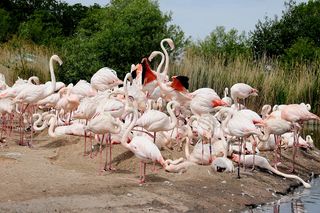Friends
What Can Flamingos Teach Us About Friendship?
Flamingos form enduring friendships, a five-year study reports.
Posted April 14, 2020 Reviewed by Jessica Schrader

Flamingos form loyal friendships that endure for many years, according to a five-year study of four flocks of captive flamingos. This University of Exeter study (Rose & Croft, 2020) appears in the June 2020 issue of Behavioural Processes.
Although flamingos are notoriously social and like belonging to a flock, Paul Rose and Darren Croft found that male and female flamingos also choose to spend dyadic, one-on-one time with a "best friend." The same "BFF" flamingo friendships that were present when this study began in 2012 were still going strong when the study ended in 2016.
The four flocks of flamingos evaluated for this study represented four different species (e.g., Andean, Caribbean, Chilean, and Lesser). All of these captive flamingos were inhabitants of WWT Slimbridge, a wetland wildlife reserve in Gloucestershire, England.
"Flamingos have long lives—some of the birds in this study have been at Slimbridge since the 1960s—and our study shows their friendships are stable over [many] years," Rose said in a news release.
The flock size of flamingos in this study ranged from just over 20 to more than 140 flamingos; the largest flamingo flock also had the most social interactions. "The simple lesson of this is that captive flamingo flocks should contain as many birds as reasonably possible," Rose noted.

According to the authors: "Captive birds provide a useful model for investigating aspects of social choice in highly gregarious, long-lived species." All of the flamingo species appear to form long-lasting social bonds. "Our results indicate that flamingo societies are complex. They are formed of long-standing friendships rather than loose, random connections," Rose said.
On the flip side, flamingos also seem to hold grudges against flamingos that rub them the wrong way. The researchers found that some flamingos "just don't get on" with each other and will purposely avoid one another for years.
Another interesting finding of this research is the strength of same-sex friendships. Even if a flamingo had a strong bond with another flamingo of the opposite sex and acted like a "married couple," the intrasexual (i.e., same-sex) friendships appeared to be as stable as their intersexual bonds. "Both male-male and female-female bonds were stable over time," the authors write.
In addition to forming years-long friendships, flamingos also appear to form cliques of three or four close friends. "Flamingos don't simply find a mate and spend their time with that individual. Some mating couples spend much of their time together, but lots of other social bonds also exist. We see pairs of males or females choosing to 'hang out,' we see trios and quartets that are regularly together," Rose said.
"It seems that—like humans—flamingos form social bonds for a variety of reasons, and the fact they're so long-lasting suggests they are important for survival in the wild," he added.
During the five years of this study, Rose and Croft also noticed that the seasons seem to affect flamingos' social interactions. Flamingos tend to form closer social bonds in the spring and summer, which is their breeding season.
This study reaffirms that birds of a feather really do flock together. Social distancing appears to be a disagreeable state of existence for flamingos. Therefore, when moving flamingos from one zoo to another captive habitat, Rose recommends being "careful not to separate flamingos that are closely bonded to each other."
Unfortunately, like captive flamingos in separate zoos, many humans around the globe who are currently living under "shelter in place" stay-at-home orders during the COVID-19 pandemic have been forced apart by social distancing mandates that are required to stop the spread of this novel coronavirus.
One small silver lining: Social networking platforms and smartphones make it possible for us to be #TogetherAlone despite physical distancing; our enduring friendships can continue to thrive thanks to modern-day technology. Sadly, flamingo friends who are forced apart can't stay connected via social media and Zoom meetings.
References
Paul E. Rose and Darren P. Croft. "Evaluating the Social Networks of Four Flocks of Captive Flamingos Over a Five-Year Period: Temporal, Environmental, Group and Health Influences on Assortment." Behavioural Processes (First published online: April 04, 2020) DOI: 10.1016/j.beproc.2020.104118


